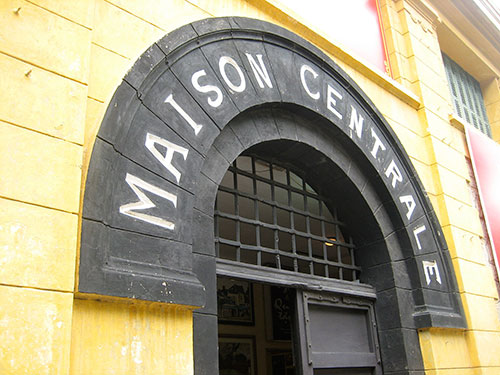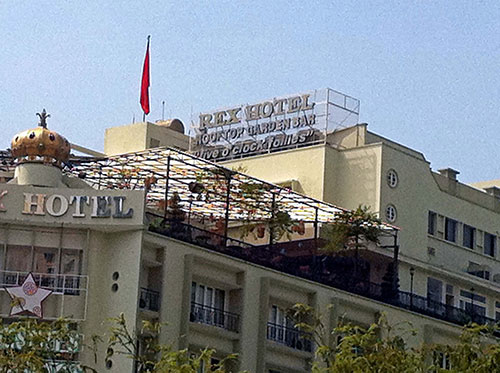Thread Count

May Sot is a sweaty little town halfway up the Thai border with Burma. I was listening to the radio in bed. A Correspondent was up there reporting on the misery of the Karen refugees, persecuted by the thug gerontocracy of the rulers of what they called “Myanmar,” and I heard his words from the radio as I lay flat on my back on the 600-count sheets I put on the credit card and will pay for next month, for sure.
The sheets are a luxury, I know, but I justify it on the grounds that I should live at home in small ways that are as nice as being on the road. When I was last in May Sot, looking at the misery, it was two decades ago. The sadness was real, and the children at the orphanage we visited would be raising their own now, the ones that lived, and their eyes would have lost their innocence.
Nothing appears to have changed there. The Junta in Rangoon has changed its name since then, but they are just as ugly, and just as implacable as the day my Boss got up and walked out of the meeting with them, walking out of the old British-built colonial pile of a building briskly with all of trailing in his wake like wind-blown leaves.
The Strand Hotel in downtown Rangoon (I could not then or now call it “Yangon”) was where we were staying, a remarkable stately old building with a majestic internal courtyard all of tropical wood built by the Victorians, and recently refurbished by the thugs who run Burma, or Myanmar, or whatever it is they are calling the lush country these days.
The bedding was excellent, and if the houseboy at his desk in the hall worked for the state security services, so be it. I propped a chair against the thick mahogany door just in case.
We were staying at the Oriental Hotel in Bangkok on the next leg of the Congressman’s trip, and the sheets were nice. There was a big press conference about the trip to May Sot, and we did not get enough time to sleep, except at the state dinner where I awoke to find a delicate dessert course in front of me.
The Thai general to my left had been nice enough to let me doze without interruption, and taking the cab back to the hotel we had no inclination to stop by New Patpong Road, where busloads of Japanese and Europeans were on the prowl for what trouble they might find.
There was plenty, if my first visit to the bars of the old Patpong thirty-five ago was any indication. Maybe that is the definition of age; caring more about the sheets than who is tangled within them.
Even miserable places have nice places to sleep, and that affects the quality of the reporting. In Haiti there are a few exceptional hotels high on the hill above Port au Prince, the Montana being the one preferred by the press corps and visiting firemen. The key is to have a decent base of operations, and a good night’s sleep.
The last time I passed through the city that once was known as Saigon, the skyline was already undergoing a metamorphosis from sleepy imperial humiliation to a bustling tiger of economic growth. The construction cranes towered over the skyline, and the familiar view from the sky bar at the Caravelle Hotel to the former Embassy would be obstructed soon.
There was talk of building a tower alongside the original ten-story building. That was where the correspondents gathered at the rooftop lounge to watch the evening rocket attacks against the big airbase at Tan Son Nhut, and chat about how the war was going.
There were several new five-star hotels in Ho Chi Minh City, and we could have stayed in one of them and slept on new mattresses, but it seemed to me that was not the point. Something was slipping away, just like the MIAs we were ostensibly there to find.
That was nonsense, of course. We were there to see if there was a way to finally end the war, at least the niggling details of the one that had ended unsatisfactorily (to us) twenty years before our visit. The MIAs were almost certainly going to stay that way, though of course assorted remains would be parceled out (at considerable expense). O one wanted to inquire too deeply as to exactly when the remains stopped being living men, and became heaps of often-charred bones and ash.
Our presence in Vietnam was a liaison office in Hanoi, which kept its name, and we stayed in the Metropole, a very nice hotel indeed.
The officers assigned to the liaison office had noticed that the Host Nationals were tearing down the Maison Central, the French-built prison for Vietnamese dissidents and criminals that had an emotional ring for Americans. In our time of involvement, it had been the Hanoi Hilton. The liaison officers took away some of the bricks from the demolition site to hand out as souvenirs for visiting firemen, like us, and as the horse-holder for the expedition, the had the opportunity to haul the better part of a brick wall around in my luggage.
That brick from the Maison Centrale is now in a frame on the wall down at the farm, along with a copy of the rules imposed on the prisoners there. I think about it sometimes, when I actually limp up the stairs. Back then, the Caravelle belonged to the State, and had sunken into a Stalinist Intourist-style somnolence. It had not been upgraded. As penance for our defeat, and because I was responsible for the logistics, I booked us into the Rex Hotel, the massive colonial hotel near the Opera House and the market.

The Rex had been the home to the Military Assistance Command’s afternoon briefings on the war, timed to permit the correspondents to file their reports for the morning news in Washington. The beds were hard and the rooms Spartan, and I spent part of the evening washing the grit from some souvenir bricks we had been given in the capital of the united Socialist Republic of Vietnam the day before. That night, I felt I was not alone in the little room in the great dark hotel, and there was a physical feeling of enduring sadness that one does not find in a new place that has not yet created its ghosts.
In the bad times, it was possible to walk from the Caravelle over to the Rex, take in the afternoon briefing, and then return for dinner and drinks in the rooftop bar for the evening glimpse of the war in the suburbs.
Overlooking Lam Son Square and the Opera House, the rooftop was the ideal place to watch the story go by as the sky was lit with rocket attacks at Tan Son Nhut. There were plenty of sources who came to the bar, and many an excellent story was written without ever leaving the immediate precincts of the Hotel.
Sometimes the story is really about the thread-count. Before the fall of Saigon, the beds and the sheets were pretty good at the Caravelle. And it was an easy walk over to the Embassy when it was time to get a helicopter out of town.
Why the ghosts and the hotels? Why today?
There is something bad that happened, a really bad footnote to a lost war that has been papered over for too long. I am not sure if I have the energy left to follow all the threads that are left over. All the men left behind, or kidnapped to foreign lands and whose stories will never be told.
I feel like I have to try, at least until the images from those days long ago make it too difficult to sleep, regardless of the thread count on the bed in which I sleep.
Copyright 2016 Vic Socotra
www.vicsocotra.com
